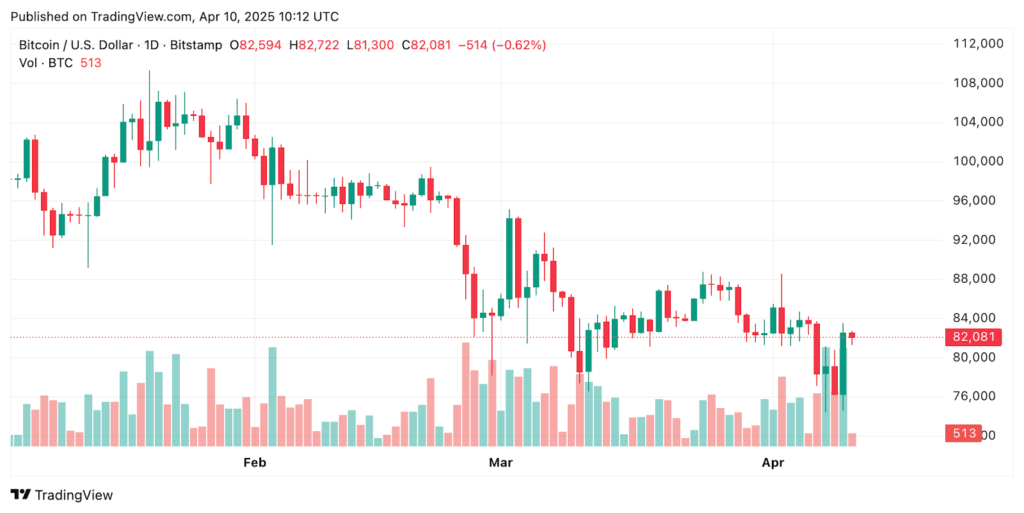As global trade tensions rise once more, investment firm VanEck has revealed that China and Russia are reportedly conducting some of their energy transactions using Bitcoin.
This development is part of a widening trend towards de-dollarization, a movement that has gained momentum, particularly due to aggressive tariffs imposed by the Trump administration targeting China and European Union nations.
Russia and China are settling oil trades in BTC. I’ve heard first hand accounts of similar transactions with Venezuela. Full tankers are settled in BTC on the “grey” market. The U.S. Government crossed the Rubicon in 2022 by seizing Russian assets at the Federal Reserve and… pic.twitter.com/Y8OwJROw9W
— Jonathan Hamel (@jhamel) April 9, 2025
Countries Moving Towards Cryptocurrencies Amid Global De-dollarization
In a report titled “Digital Assets: De-dollarization Moves Bitcoin Towards Monetary Role,” authored by Matthew Sigel, VanEck places Bitcoin at the forefront of a rapidly evolving geopolitical and economic landscape.
The report contends that recent shifts in policy and an increasing fragmentation in global trade are fueling the demand for neutral, decentralized alternatives for transactions, positioning Bitcoin as a leading candidate.
Following the announcement of new tariffs by the Trump administration on April 2, Bitcoin’s value briefly dropped from $85,000 to $81,000.
Source: Cryptonews
However, despite this initial decline, Bitcoin has continued to outperform traditional indices such as the Nasdaq over various time frames, including the last decade.
VanEck highlights that while slower economic growth may not inherently boost Bitcoin, a potential dovish response from central banks, particularly the Federal Reserve, could rekindle Bitcoin’s strength by injecting liquidity into the market.
What sets this moment apart is that Bitcoin adoption is moving beyond speculative realms into practical application.
Both China and Russia are actively utilizing Bitcoin and other digital assets for a portion of their energy transactions.
Matthew Sigel, VanEck’s Head of Digital Assets Research, affirmed this trend, stating:
They are not isolated in this endeavor. Bolivia has also rolled out plans to import electricity through cryptocurrencies, and French energy utility EDF is exploring the possibility of using surplus electricity, currently being exported to Germany, to mine Bitcoin.
Bitcoin’s Role Expands Amid Dollar Weakness
The context of these developments is significant. As China and Russia embrace Bitcoin, the Trump administration has heightened its trade warfare by imposing a steep 125% tariff on Chinese imports.
In a statement made on Truth Social, President Trump accused China of manipulating global trade systems and asserted that the era of “ripping off the USA” was coming to an end.
While tariffs on other countries were postponed by 90 days, the drastic increase against China signals a firm stance from Washington.
 Global markets responded sharply after @POTUS announced a major escalation in his trade stance toward China.#Tariffs #Trumphttps://t.co/GDJxWUZDdg
Global markets responded sharply after @POTUS announced a major escalation in his trade stance toward China.#Tariffs #Trumphttps://t.co/GDJxWUZDdg
— Cryptonews.com (@cryptonews) April 9, 2025
The immediate market reaction saw Bitcoin surge by 5.6% within an hour, reaching $81,636.
This surge, however, also contributed to increased global volatility. In retaliation, China elevated its tariffs on U.S. goods from 34% to 84% on April 9.
 Russia is ramping up its use of Bitcoin for international trade to bypass Western sanctions.#Bitcoin #Crypto #Russiahttps://t.co/3HaGeP9pVx
Russia is ramping up its use of Bitcoin for international trade to bypass Western sanctions.#Bitcoin #Crypto #Russiahttps://t.co/3HaGeP9pVx
— Cryptonews.com (@cryptonews) December 25, 2024
Importantly, Russia had already been paving the way for this shift, with previous reports indicating an increasing embrace of Bitcoin for foreign transactions.
The Broader De-Dollarization Movement
VanEck’s report places these developments within the context of the ongoing trend of de-dollarization.
As Sigel points out, a declining U.S. dollar could solidify Bitcoin’s status as a hedge against fiat currency devaluation and geopolitical instability.
He referenced the U.S. Dollar Index (DXY), which has fallen over 7% year-to-date, currently standing at 102.5.
A prolonged decline in the dollar would bolster the narrative of Bitcoin as a protective asset, especially in the face of escalating global uncertainties.
This perspective was echoed by Jane Foley, head of forex strategy at Rabobank, who remarked that Trump’s policies are inadvertently fueling the very trends they aim to curb.
“Trump threatened countries that tried to de-dollarize with extra tariffs. Ironically, his isolationist policies may drive the trend,” she noted in comments to Reuters.
Even before these recent tariffs, analysts across Europe were forecasting a shift away from reliance on the dollar.
VanEck advises investors to keep a close watch on various indicators such as Federal Reserve policy, Treasury yields, Bitcoin exchange-traded product flows, and on-chain activities.
As trade conflicts intensify and nations seek alternatives to a dollar-dominated system, Bitcoin is poised at a pivotal juncture. What was once a speculative investment is increasingly recognized as a strategic asset for trade and financial independence.
The post VanEck Confirms China and Russia Settling Energy Trades in Bitcoin appeared first on Cryptonews.


























